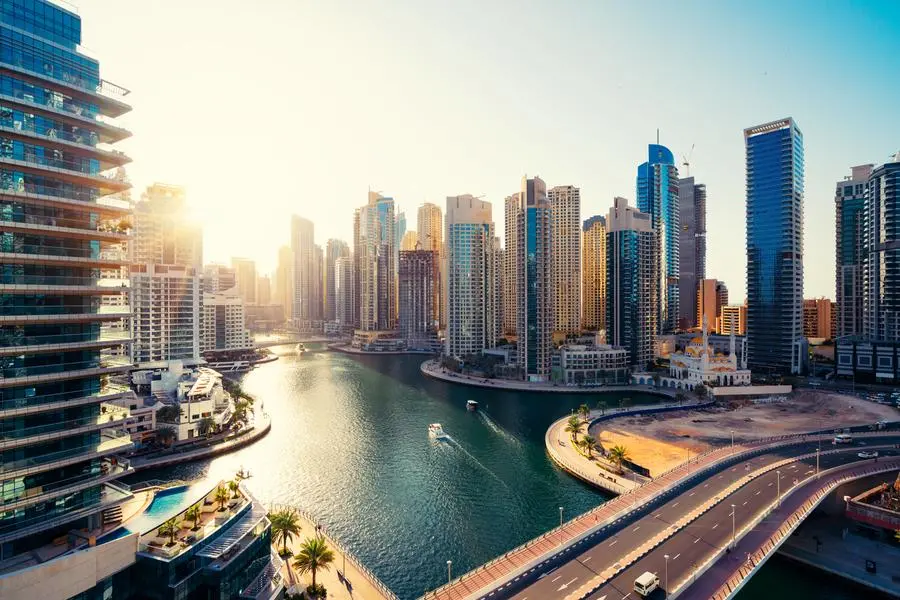PHOTO
The UAE aims to double the size of its economy by 2031 and diversify away from hydrocarbons.
The UAE is expected to record robust economic growth in 2023 despite a slowdown largely driven by Opec+ policy that reverses last year’s increase in oil production, according to economists.
The GDP is on track to register 3.2 per cent in 2023, down from 7.9 per cent in 2022 with the non-oil sector growing by 3.9 per cent compared to 6.6 per cent in 2022, according to the latest Economic Insight report commissioned by ICAEW and compiled by Oxford Economics.
Hanadi Khalife, head of Middle East, ICAEW, said despite oil prices falling from their previous highs, there is reason to be optimistic. “With the UAE’s recent trade agreements, tariffs have been significantly lowered. This leaves room for the UAE to expand and diversify its non-oil sectors even further and continue to grow.”
The UAE aims to double the size of its economy by 2031 and diversify away from hydrocarbons. "In order to do that, we need 7.0 per cent GDP growth every year," UAE’s Minister of Economy Abdulla bin Touq Al Marri said recently on the sidelines of the Investopia conference in Abu Dhabi.
Essam Abu Suleiman, World Bank Regional Director for the GCC, said in a recent interview that despite the difficult global economic conditions, estimates suggest that the UAE economy will grow by about 4.1 per cent next year, benefiting greatly from the strong recovery of the non-oil economy.
Oil production in the UAE is expected to be broadly flat in 2023, compared to 2022. “However, high-frequency data, as well as anecdotal evidence about activity, indicate the non-oil economy continues to perform strongly. The PMI for the non-oil sector was 54.3 in February, representing a three-month high, having been firmly in the expansionary territory through 2022. This current rise in activity is also leading to labour market improvement,” analysts at Oxford Economics said.
Oil sector revenues are expected to remain robust despite oil prices weakening and Opec+ cutting production quotas. This should enable the government to support overall GDP growth this year, while also running a budget surplus of 3.7 per cent of GDP, down from 4.2 per cent of GDP in 2022.
"The UAE authorities are using the weakened oil prices as an opportunity to implement policies to encourage the development of new sectors such as the digital economy, creative industries, and scientific innovation as part of the “We the UAE 2031” vision. It enters the next decade with an ambitious strategy, which will continue to diversify its economy across sectors and provide a roadmap for future growth,” said Scott Livermore, ICAEW economic advisor, and chief economist and managing director, Oxford Economics Middle East.
The real estate sector continues to perform strongly, driving the growth momentum. Sale prices of residential homes had been falling for several years, but the market is now rebounding, with house prices rising in Abu Dhabi and property sales in Dubai hitting decade highs in recent months, the report said.
“A positive dynamic is expected to continue in the real estate market; however, a gradual moderate increase in rents is likely as new supply comes online during 2023.”
Another growth driver is the tourism industry which is on a fast-track recovery mode. “After receiving a boost from the World Cup in Qatar, Dubai is again among the world's busiest international airports, with passenger numbers rising 67 per cent year-on-year in Q4 2022 to their highest levels since 2019. Tourism is expected to continue recovering and the report forecasts international visitors will increase by 20 per cent in 2023, surpassing pre-pandemic levels,” analysts said in their report.
Copyright © 2022 Khaleej Times. All Rights Reserved. Provided by SyndiGate Media Inc. (Syndigate.info).





















